The Cockerel


BOLTON SCHOOL BOYS’ DIVISION NEWSLETTER ISSUE 20 -

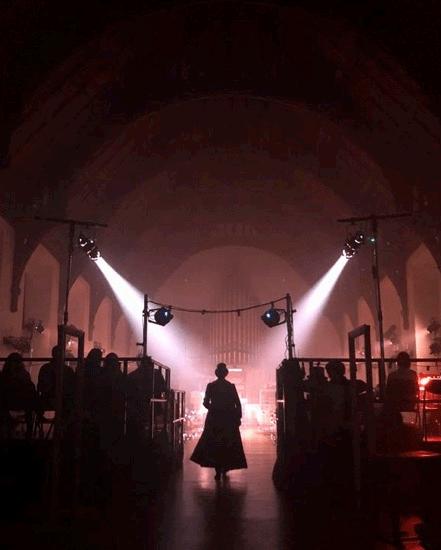







Over 1,000 GCSE and A level students from across the region recently enjoyed the Bolton School Careers and Higher Education Fair. Over forty employers and thirty plus HE institutions from Dundee to Falmouth, as well as international universities, had stands at the popular event. With seminars on improving your employability, applying to dental school, routes into a legal career, student finance, studying abroad, Oxbridge application, applying to medical school and apprenticeship opportunities, the evening once again proved to be a must-attend event for Year 9-13 students and their parents.
The event has been running for over 20 years and is one of the largest of its kind in the North West. There were delegates from a wide range of businesses – some offering apprenticeships, representing careers in law, medicine, journalism, accountancy, engineering, construction, architecture and much more. Amongst the HE providers were the University of Manchester, the University of Sheffield, the University of Leeds, Durham University, Bath University, the University of Edinburgh, the University of Liverpool, the University of Law, the University of York, the University of Birmingham, UCLAN and the LSE, as well as more local institutions.
The Great Halls of both Divisions and the shared Riley Sixth Form Centre were used for the event and Senior Teachers and Year 12 ‘ambassadors’ greeted exhibitors, helping them with parking, registering and setting up; they also welcomed and helped attendees.



Callum and Matthew Parkinson, having left Bolton School in the summer of 2013, returned to school to talk to the current crop of aspiring elite athletes. In an informal question and answer session, the 22-year-olds talked candidly about their time at School and as professional cricketers playing for Leicestershire and Lancashire.
Matthew recalled how he was picked for Lancashire at the age of 10 and played with the Academy until he was 17 years old; he recalled how the School was always supportive of him during this time, conscious that he was contributing a lot to school, district and county cricket. Both players talked about the struggles of keeping on top of their schoolwork and how they had to develop a routine, manage their time and often work at lunchtime. Both commented on how once they had left Bolton School aged 16, they felt more isolated and thought they would have got better A Level results if they had stayed on! Matt signed professionally for Lancashire in his last year of college.
Callum talked about his time at Lancashire and his decision to sign for Derbyshire and then, after a year, for Leicestershire. Asked about his career path, he told boys and girls that they need to look at the bigger picture and if things

are not going your way and you do not see a clear path, then don’t be afraid to take a risk. He told how, aged 16, he went down a couple of leagues and worked his way back up.

Matt reflected how, at 11 years old, he was the fastest bowler with Lancashire at that age, but after talking it over with his dad, by the time he was the age of 14 he had changed to become a seam bowler.
selected for the England Test and T20 squads to tour New Zealand this winter. The Chairman of Selectors had tried to call him, but he was fielding at the time and word got out to him via players on the pitch! Callum also looked forward to playing cricket over the winter in Adelaide and pointed out it was not too far away for him to go and watch his brother in action for England.
The twins reminisced on how their year group had been blessed with sporting talent, including a crop of good footballers and Haseeb Hameed, who went on to become England’s youngest cricketing opener in 2016. They recalled winning the Under 15s’ ESCA/ECB T20 National Cricket Final in 2012, with an emphatic 10 wicket victory over Whitgift School from Croydon. Both players also recounted their best cricketing moments at school, with Callum citing a score of over 100 against Merchant Taylors’ School when he was in Year 11. Matt said for him personally, he always enjoyed ‘playing up’ a few years, as it put him out of his depth and made him improve. From Year 8 onwards, he regularly played in the School’s first team. Both were impressed with the School’s new elite athlete programme and talked of the importance of developing a relationship with teachers around work and exams.
Both cricketers attended Bolton School from the Junior Boys’ School (Park Road) until Year 11 of Senior School, leaving in 2013.
Asked about playing each other, they agreed that this was ‘one to get through’. Matt recalled how they were playing each other in the final game of the season when he learnt that he had been



Bolton School was delighted to welcome social historian Hallie Rubenhold, recent author of The Five: The Untold Lives of the Women Killed by Jack the Ripper, as the latest speaker in its series of enrichment lectures. Hallie prefaced her presentation by saying she would not be talking about Jack the Ripper or the 500 or so suggestions put forward as to who the killer might be – everyone from Prince Albert, the Duke of Clarence to Lewis Carroll! Instead, like her highly acclaimed book, she wanted to focus on the lives of the women who were murdered by him.
The talk charted the lives of each woman: Mary Ann (Polly) Nicholls, Annie Chapman, Elizabeth Stride, Catherine Eddowes and Mary Jane Kelly. All were murdered in the Whitechapel (now Spitalfields) area of London during the years 1888-1891. By telling their stories – at least as much as could be told given the lack of definitive evidence about their lives – she gave back to the women some kind of dignity. She also offered a compelling insight into poverty and degradation in late nineteenth century Britain. Hallie’s evidence suggested only one of the women and the youngest to die, Mary Jane Kelly, made a living out of prostitution; and that Elizabeth Stride occasionally fell back on it when destitute. Hallie excoriated the police and sensationalist press who were all too eager to uphold Victorian stereotypes as they painted the Ripper as a vigilante murderer of ‘fallen women’ but the truth was that he was a killer of vulnerable women. These were gender crimes and not sex crimes. What the women had in common was that they were destitute, shiftless and four out of five of them were alcoholics. In telling their stories, the audience learnt that none of the women were originally from the East End and all had led full lives with most of them having been married and had children of their own. Women in Victorian society struggled without a male protector and either through poor

judgement or misfortune, each found themselves falling on hard times. They were often in an out of the workhouse, in cheap lodgings, tramping or sleeping rough. With the exception of his last victim, all were in their forties and the average age to die for a Londoner at the time was 44. All but one was probably killed in their sleep. Hallie commented that large crowds were drawn to their funerals, as the murders captured the imagination of the public and each woman was given a dignified burial.
A question and answer session concluded the evening and Hallie spoke about the difficulties of her research and how newspaper reports would often be contradictory; she said there was no proof that the women knew each other; she talked about social problems dogging Spitalfields right up to the 1990s; about misogyny and whether it has really gone away; and how she believed that the police’s fixation on the idea that the women were prostitutes impeded their own investigation.
This talk was part of a series of Arts and Sciences Enrichment Evenings hosted each year by the Girls’ Division. Click here to view the full programme of events for 2019/20.





Olympic athlete Jenny Meadows visited Bolton School to deliver an inspiring message to pupils in the Junior and Senior Schools. She talked to boys and girls about unlocking their potential and offered lots of tips and advice based on her experiences at World and Olympic level.

Jenny first addressed interested Girls’ and Boys’ Division Senior School pupils during their lunchtime, followed by a talk to the Junior Boys’ School. Later in the afternoon, boys in Year 3 enjoyed sessions with her and her husband and coach Trevor Painter, who is also British Athletics Pathway Coaching Lead and GB Under 20 Team Leader. After school, Junior Boys and Girls in the Cross Country squads enjoyed an additional coaching session.
In her talks, Jenny began with an overview of her career, from her origins as an ambitious seven-year-old telling coaches at her very first training session that she wanted to go to the Olympics, through the tough teenage years when she felt “like a small fish in a very big pond”, to competing and winning medals in the 800m at international competitions. She shared a video of her first ever medal win in 2009 World Championships: a Bronze which “felt like a Gold” because it was the first time she had successfully transitioned her training into competition. She felt she had achieved her potential at that point, as well as overall in her career.
Jenny went on to describe some of the difficulties and disappointments she has faced in her career. In particular, she talked about being unable to compete in the London 2012 Olympics due to injury and the importance of focusing on what she could do, rather than what she couldn’t do, at this time. She discussed her training regime during the time when she was unable to run, which even included running on an ‘anti-gravity’ treadmill! As a result of her efforts, she came back stronger from this experience, both mentally and physically, and beat lots of her personal bests when she finally returned to running.
This led her to talk about the importance of failure and its benefits in developing the mental fortitude needed to carry on when the going gets tough. She said that “life is not always fun”, but if you persevere through difficulty, you will end up doing better and competing for longer than someone who has only ever succeeded. Finally, she offered pupils advice on the mental characteristics needed to compete at high-level sport and gave
lots of tips for developing excellence.
Junior and Senior School pupils alike were really inspired by Jenny’s visit and no doubt came away from their session with her with plenty to consider for their own sporting careers going forward.



Growing up in the former USSR, I learned from an early age that there were certain things that you should never talk about, one of them being my grandparents’ deportation to the GULAGs. However recent visits to the GULAG History Museum with our Year 13 Russianists suddenly made me want to find out as much as possible about this tragic period in Russian history and in my family’s history.

My GULAGs journey began in Moscow when I boarded a train, which after 40 hours took me to my first destination – the arctic city of Vorkuta. In 1944, it took my grandparents a number of weeks to complete this very journey in far less “luxurious” conditions.
The first impression upon arrival in Vorkuta was: “This place is not fit for living”. Despite the fact that we were only ten days from the summer, it was still -3 C, plummeting to -7 C at night. Yet around 60,000 people still live and work here! Who are these people and why are they prepared to live in a place where winters last for almost ten months?!
The abandoned coal mining settlement of Rudnik where the first 9000 political prisoners were brought in 1932 to work at the very first Vorkutlag mine is a testimony to the cruel and inhumane communist system. Only 150 of those prisoners survived these harsh conditions.
they can to keep the history alive, however the authorities would rather not talk about the past, especially when the past is quite ugly.
Having visited the Vorkutlag, having seen the monument erased by the German, Polish, Lithuanian and Ukrainian governments to commemorate the victims of the 1953 Vorkutlag uprising, I did not think that there would be a place where political prisoners’ living conditions and the level of cruelty could be worse, until I visited the “Mother of Gulags” – archipelago Gulag Solovetsky. This truly magnificent place, a place of worship for hundreds of years was turned into a concentration camp by the order of Lenin in 1923. 200,000 went through the “Mother of Gulags“ between 1923 and 1937 with only one in three surviving it.
One of the island’s landmarks - the Negotiation Stone, which is a testimony to the peacefully ended negotiations between a British officer and the abbot of the monastery during the Crimean War, made me feel proud to be British.
What struck me most was that despite the “uniqueness” of this place, there is virtually nothing in Vorkuta that is dedicated to the region’s past. The Gulag Museum closed down three years ago and there are no plans to reopen it in the near future – a strange decision, considering that hundreds of thousands went through the Vorkutlag. There are a handful of individuals doing everything
I am very grateful to the School for allowing me to undertake this journey, a journey that makes you realise how lucky you are to be living in a free, democratic country.
Mrs. V. Tymchyshyn
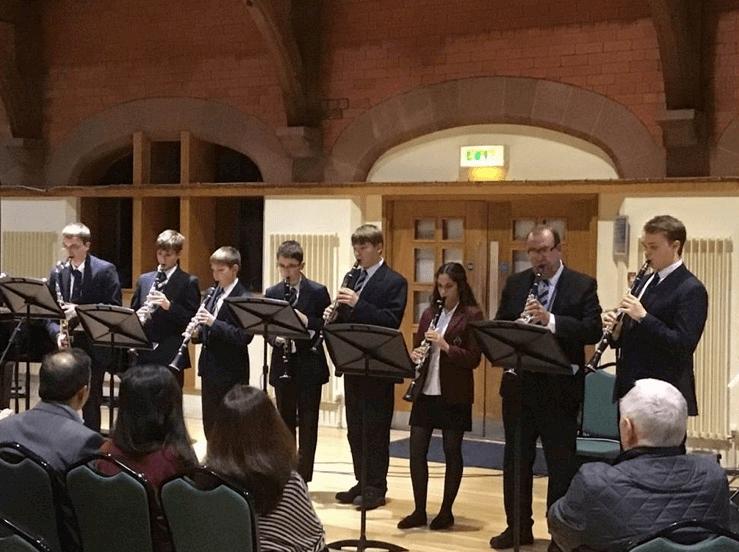

On Wednesday 16 October, 25 Bolton School pupils representing every year group from Years 7-13 entertained a highly appreciative audience in a Musical Evening in the Arts Centre. The concert began with Georgia On My Mind performed by the Joint Clarinet Group. This was followed by 20 bass guitar, clarinet, drum kit, piano, tenor horn and vocal solos, together with a vocal duet.
As always, there was a huge range of musical styles to enjoy, performed to an impressively high standard. Congratulations to all of the performers! The next Musical Evening of this type will take place on Thursday 14 May and a warm invitation is extended to all.

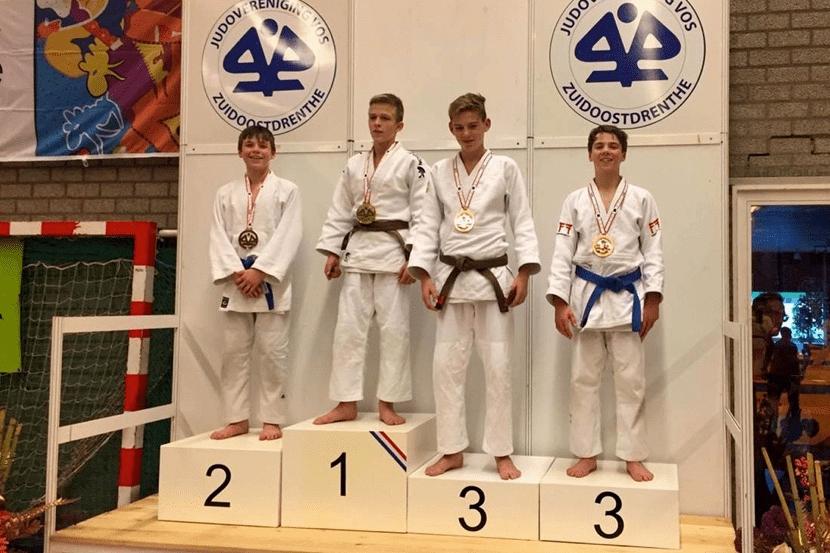


Year 10 pupil Jamie Death represented England Judo at two competitions in Holland this month. He had a fantastic performance at the Emmen International Open, where he obtained the silver medal. He took part in the U55kg, Under 15 section against 37 other fighters, including many European competitors, who were much larger. Unfortunately, he was injured on the Sunday in Alkmaar, but nonetheless his silver medal is a great achievement.


Competing in Italy at the World Thai Boxing Championship, Marcus Williams, a Year 10 GCSE pupil, has won a gold medal in the Under 16 category!


Marcus had a tough fight camp which was reduced to three weeks from six, having suffered a horrendous toe injury in training. Despite this, he cut his weight well in the competition and fought his way through to the final where he met a tough opponent from Israel. Marcus lost the first two rounds but woke up in the third to win rounds 3, 4 and 5 and, with the last rounds counting more in Thai Boxing, this was enough to secure him overall victory!



Congratulations to Year 10 pupil Ziyaad Tahier, who participated in the ITF (International Taekwon-Do Federation) National Championship in Stratford-UponAvon earlier this month. He won a bronze trophy in one of the events.



One hundred years since the first Remembrance Sunday and the laying of wreaths in Whitehall, pupils, staff and governors gathered in the Great Hall to mark “the most solemn of days in the nation’s calendar”.
The assembly was led by Dr. Holland, who paid tribute to those soldiers who fought in conflicts from World War I to the present day. Last year, pupils had recalled ten former pupils who made the supreme sacrifice in the months and weeks before the Armistice. This year, Dr. Holland paid tribute to Captain Robert Cecil Hearn MC and Lance Corporal John Entwistle, both of whom taught in the Boys’ Division and lost their lives in the First World War. Three boys then told the stories of three Old Boys who died after the 1918 Armistice had been signed: Cadet Sergeant Stanley Bolton, Captain Cyril Gerrard Hasleden and Deck Hand Jack Russell Brown.
Dr. Holland considered the signing of the Armistice in the countryside near Compiègne and how it was largely written by Marshall Ferdinand Foch of France and how, although it brought to an end the fighting on the Western Front, it had to be prolonged three times before the Treaty of Versailles was signed in June 1919. He read moving poems reflecting on the senselessness of war by A.E. Housman and Cecil Day Lewis.


Today, Dr. Holland told the whole school gathering, is Poland’s Independence Day and he recounted how the Nazis systematically destroyed the Polish nation, decimating its culture, economy, literature, educational system and currency, and slaughtering 3.3m Jews, whilst it hoped to settle 12 and a half million Germans into the region. During World War One, the Poles lost 22% of their population, more than any other nation.


There was also mention of the many well-made war films, which recount battles from the 1939-45 conflict and Dr. Holland focused on The Battle of the River Plate, which, taking place in the South Atlantic in April 1940, was the first naval battle of the Second World War and told the story of firepower, willpower, strategy and diplomacy.
Dr. Holland told how 57 former pupils lost their lives in the Second World War and also of those that have suffered in subsequent wars including Korea, Malaya, Northern Ireland, The Falklands, Iraq and Afghanistan.
An impeccably observed two-minute silence preceded a solemn procession through the Great Hall and the laying of poppy wreaths by Sixth Form students by the memorial window as the words of “Lest We Forget” were spoken.


Andrew Warburton, who left Bolton School in 2014 having attended from Nursery through to Sixth Form, returned to his alma mater to tell the current crop of GCSE and A Level Computer Science students about how he became a Software Engineer.

Andrew recounted how he took Computer Science, Maths and Physics for his A Levels. He told the audience that he had initially intended to study at the University of Manchester, but they had required three As and he only achieved two As and a B. Newcastle University made him an offer and he did not look back, thoroughly enjoying his time in the North East. He found the course to be very practical, which suited him and thinks the course at Manchester might have been a little more technical.
Recalling his own A Level study, he said these were a tough two years, but worth it. His top tip for A Level and degree study was to look at past papers and to do them all again and again and again. He found the first year of his degree course to be relatively straightforward and then things got increasingly difficult. Ultimately, he graduated with a BSc in Computer Science, specialising in Gaming. Andrew advised the boys to start planning what they are going to do next as they enter their third year of their Bachelors. He went on to Manchester University, where he undertook a Masters in A.I. This, he said, was a really hard year, which moved very quickly, but it was very much worth the effort as it sets you apart from other graduates. As you are in the top tier, he told them, you can potentially earn more. He also said that a PhD is an incredible amount of work, but very much worth it if you pick a subject which is in demand from employers and gave examples of graduates earning as much as £150k p.a.
In his new job, Andrew said he has learnt that education never stops, and he is improving all the time at fixing bugs. He looks upon every problem as being a puzzle to be solved and the bigger the problem, the better. Advising boys on their careers, he told them to choose something that they enjoy and to ‘go with your gut feel’, as that is probably the area you are best suited to go into.


Bolton School’s Under 13 football team enjoyed a profitable trip over The Pennines recording an impressive 4-1 victory over The Grammar School at Leeds in the ISFA Cup. The victory puts them into the last 16 teams nationally.
In an initially tight encounter, both teams struggled to deal with the wet and wintry weather and the score line remained 0-0 at half-time. Bolton School started to get the better of the conditions in the second half and they began to assert their dominance. A superb team performance enabled them to win 4-1, with goals from Zach Baumann, Emmanuel Eze and a brace from Zach Giggs.
Head of PE Mr. Johnson said: “This was a very tricky tie in appalling conditions. The lads battled extremely hard and played some brilliant football. They thoroughly deserved the win and we hope for a home draw in the next round.”



Concert season in the Boys’ Division commenced with the Autumn Concert. Pupils, parents and staff gathered in the Great Hall for performances which combined music from film scores and musicals with traditional tunes, choral arrangements and a range of reimagined chart hits.

The Drum Corps, directed by Mr. Forgrieve, provided a lively opening with Marcia Ritmica, which was the perfect setup for the evening’s entertainment. The Joint Senior Concert Band recently won a Platinum Award at the National Concert Band Festival (NCBF), and the group was, once again, in fine form, as they followed up with three pieces: Into the Clouds, How To Train Your Dragon and Klezmer Karnival. The Tuned Percussion Ensemble then took to the stage to play instantly recognisable hits I’m Not In Love by 10cc and Hot Fudge by Robbie Williams.
Next came the Junior String Quartet, changing the tempo with two traditional pieces, Irish Washerwoman and Pretty Little Sally. The Steel Pans Group then played Mambo No. 5 and Walking on Sunshine. Continuing with the pop theme, the Senior Guitar Group performed Queen’s Crazy Little Thing Called Love and Van Morrison’s Moondance.
The Joint Chamber Choir gave beautiful renditions of I Will Sing With The Spirit by John Rutter and You Will Be Found from the musical ‘Dear Evan Hansen’ and, continuing the musical theme, the Join Clarinet Group played The Music Of The Night from ‘Phantom of the Opera’. They followed this with Coldplay’s Viva La Vida and afterwards the Joint Senior Violin Quartet played a Gavotte.
Boys in Year 8 provided a toe-tapping finale to the evening, singing a trio of pop hits: Love is Easy by McFly, Africa by Toto and finally Karma Chameleon by Culture Club.
The audience was thoroughly entertained throughout the evening and, with such a wide range of musical styles in the programme, there was something for everyone to enjoy.

‘

A400-strong public audience, including pupils from five local schools, attended the much-anticipated enrichment presentation from television presenter and anthropologist Professor Alice Roberts at Bolton School Girls’ Division. This talk was part of a series of Arts and Sciences Enrichment Evenings hosted each year by the Girls’ Division. Professor Roberts’ thoughtful and engaging talk, entitled ‘Tamed: Three Species That Tamed our World’, delved into the fields of archaeology, science, history and genetics, as she revealed the stories of three species that became our allies: dogs, horses and cattle. She explained that in asking herself what it is that makes us human, she began to question whether we can apply this research to other species, particularly those that are now ‘at our side’; this proved to be the wellspring for her book Tamed, which uncovers the amazing history of ten familiar species with wild pasts.

Professor Roberts reminded the audience that when Charles Darwin introduced the concept of evolution by natural selection in his book On the Origin of Species, he started his work by looking at domesticated species. She explained how he bred and used his own pigeons to explain his theory and she also cited the example of farmers being able to change the breeds of their livestock over time.
For hundreds of thousands of years, Professor Roberts explained, our ancestors depended on wild plants and animals for survival. They were hunter-gatherers,
consummate foraging experts, taking the world as they found it. Then a revolution occurred – as their interaction with other species changed. They began to tame them. The human population boomed, and civilisation began. As humans moved to a more sedentary lifestyle, small settlements evolved, and on the edge of these camps, wolves roamed, scavenging for leftover food. Gradually they became more and more involved with humans and she told how European grey wolves mutated into dogs – even today, the professor noted, there is only 0.5% difference in DNA across all species of dog. This domestication of dogs happened long before that of cattle, sheep, pigs and goats. She then recounted the tale of the differences of opinion between scientists, biologists and geneticists, explaining how dogs split away from ancestral wolves at least 15,000 years ago, but, depending on who you believe, it could have been as long ago as 30,000-40,000 years ago in the depths of the Ice Age.
Professor Roberts described how the domestication of cattle from early Oxen began about 10,500 years ago, when the world was warming up after the retreat of the ice sheets. She also told how our forefathers could not drink milk, but, with the taming of cattle, our bodies gradually mutated, allowing us to drink fresh milk.
what is now North Kazakhstan. This changed everything as people were capable of travelling further distances, spreading knowledge and making incursions into other people’s camps. Horses were used in warfare, Professor Roberts explained, right up to the First World War.
The professor fielded an eclectic range of questions from the audience including how much DNA do dogs and humans share, where are the oldest horse remains, how do Philosophy and Genetics complement each other, how do genetically modified animals affect natural selection and what inspired you to become an anthropologist (the answer being great teachers).
Speaking about how current agricultural practices are one of the biggest contributors to global warming (40% of the earth’s land surface is given over to farming), Alice finished her presentation by warning that politicians need to wake up to the crisis and that it has taken far too long for humans to realise they are part of nature not separate from it. In order to save the planet, she said, we desperately need to work out how to thrive with nature!
Professor Roberts then turned her attention to how humans domesticated horses 5,500 years ago during the Bronze Age in

This year’s Tillotson Lecture was given by The Rt. Hon. Sir Ernest Ryder. An Old Boy, who attended the Boys’ Division from 1962 to 1976, Sir Ernest is now the Senior President (Chief Justice) of Tribunals in the UK, a Lord Justice of Appeal in England and Wales, a Privy Counsellor and the Chairman of the Administrative Justice Council. He spent much of the afternoon speaking with pupils and answering their questions, before taking the stage in the evening to speak about the changing face of justice.

He began by posing the same question he was asked in his Cambridge interview: why do we not have a national legal service? To answer it, he gave a comprehensive overview of the past, present and future of the justice system.
First, he looked back to the 1940s, when the Government tackled the “Five Giants of Want, Disease, Ignorance, Squalor and Idleness” and ultimately established the Welfare State, following the 1945 general election. However, there was a sixth Giant: Injustice, or the denial of access to justice.

He went on to describe the Justice ecosystem: a system of systems, which also encompasses Parliament, the police and the prison service in addition to the courts and legal profession. In such a complex structure of organisations, reform cannot be viewed in isolation and Sir Ernest advocated a much broader, holistic, ‘joined-up’ approach similar to that taken with the other five Giants. With this in mind, he set the audience a challenge: “to examine the justice system as a whole, with the aim of slaying the sixth Giant.”
He advised that such a task would require those responsible to be critical of the choices made in the past, realise that they might not have been the best choices at the time and not assume that they are the best choices now. He then advocated principle as the starting point, and identified and described his four basic principles of the justice system.

Next, he questioned how these principles might be implemented. He went into some detail through his speech about the ways the sixth Giant of Injustice has been addressed so far, from the creation of the Legal Aid and Advice Act to further development of Tribunals and ombuds schemes; increasing online access to justice; the modernisation of courts and tribunals; and even the potential use of AI to determine the most appropriate pathway to justice. He also talked about moving from an adjudicatory to a problem-solving approach: justice systems around the world are now working to prevent disputes in the first place. He held up as an example the United States model of Interdisciplinary Team Practice, which aims to put the parties in the best position to resolve the dispute themselves. In closing, Sir Ernest said, “If we – if you – are to … help slay the Giant of Injustice, to ensure that we can render to everyone their due, it is time to rethink how we deliver justice – preventative, consensual and adjudicative. It is time we take a new approach to it, treating justice as a system of systems each with a necessary, funded and complementary role. If we do that, then our justice system will be properly fit for the twenty-first century: for your century.”
Following his address, Sir Ernest took a series of questions from the audience. He offered his advice to those who aspire towards a career in the legal profession and said that advocacy, problem solving, decision-making and empathy are all crucial skills for a judge. However, he also noted that many careers, from medicine to architecture, also require these same skills and recommended that pupils go and see the law in action to discover if they have a passion for it. He also recommended having a plan and thinking practically. When asked questions about juries, he warned against interfering with the random selection process to make juries proportional and talked about the skills that individuals bring to the jury room. Looking to the future, he agreed that the UK will one day likely have televised court cases, especially since high court cases and significant civil cases are already being livestreamed, but warned that it would be unwise to do this with live evidence. He also spoke briefly about how media reactions to the judiciary, especially recently with regard to the ruling on Article 50, have affected judges negatively, but also said that it’s good for everyone to have a view about justice.
The Tillotson Lecture series was established in 1971 at the behest of the late Mr. Marcus Tillotson. Since then, it has become a major event on the Bolton School calendar and has attracted eminent speakers across the years, including a number of notable Old Boys like Sir Ernest.



The Joint Concert Band was recently invited to perform at the National Concert Band Festival (NCBF) heats, held at Newman RC College in Oldham on 17 November. The young musicians and their conductor Miss Sherry took this wonderful opportunity to play in front of experienced adjudicators and receive valuable feedback.
The group played Into the Clouds, How to Train your Dragon and Klezmer Karnival at the event, impressing the adjudicators with all three pieces.
Following the performance, the Band was presented with a Platinum Award: the highest possible accolade. The Platinum Award also comes with an automatic invitation to perform at the Nationals in 2020, which will be held at RNCM in April.
The Music staff in both Divisions are delighted with the Joint Concert Band’s achievement, and the young musicians involved are now looking forward to preparing for both the Nationals and the host of school music events throughout the rest of the academic year.



Members of the Girls’ Division Flute Quartet and a joint band, The Tepid Grapes, were delighted to perform at the Beech House (Infant School) Winter Sparkle Fair. The acts entertained visitors to the event for an hour and there were many fascinated faces amongst the infant members of the audience, intrigued by the flutes, drums, electric guitar, ukulele and singing. Mr. Forgrieve, who helped arrange the music, said: "Many thanks to Joseph, Millie, Eleanor, Xena, Anika, Charlotte and Lucy".

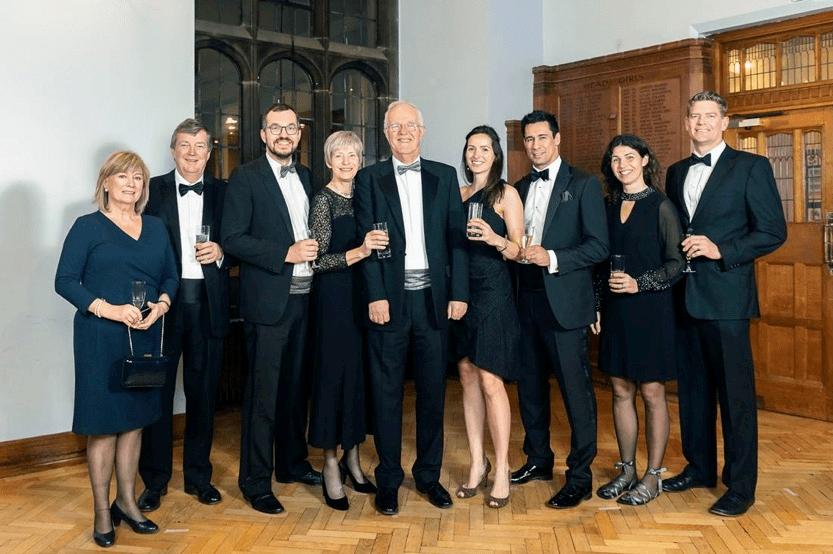

Michael Griffiths has retired as Chairman of the Governing Body at Bolton School. Mr. Griffiths, who is a former pupil of the School (1958-1965) and former School Captain, served as a governor for 33 years and took over as Chairman in 2007 from Sir Alan Cockshaw.
The School paid tribute to him at a black-tie dinner. Over 130 guests gathered, including members of Michael’s family; the Mayor of Bolton, Hilary Fairclough; Governors; Former Governors; supporters of the School’s Bursary Fund; representatives of the Old Boltonians’ and Old Girls’ Associations; representatives from both the academic and support staff and others, joined together at the event to honour Michael’s service to the School.

There were speeches from the Headmistress of the Girls’ Division Sue Hincks and Headmaster of the Boys’ Division Philip Britton as well as from the Incoming Chairman of the Governing Body Ian Riley, Mr. Griffiths’ daughter Lisa Jacobs and former Governor Ross Warburton MBE. All praised Mr. Griffiths’ incredible dedication to the School, which has seen him as pupil, member of the Old Boltonians’ Association, including periods as Secretary (1980-1988) and President (1998-1999) and member of the Governing Body since 1986. During his time as Chairman, he has overseen the building of a new Infant School, a new Junior Girls’ School and the extension of the Junior Boys’ School, as well as the recent

construction of the Riley Sixth Form Centre, the purchase of the outdoor learning centre Patterdale Hall in the Lake District and the installation of a new all-weather sports surface. However, it was noted through the tributes, that arguably Mr. Griffiths’ greatest contribution to the School has been his foresight and tenacity in developing the School’s Bursary Fund. His own experience as a recipient of a Direct Grant, which allowed him to study at Bolton School, instilled in him the belief that such an education should be open to all capable children, irrespective of
family circumstances. Due to his passion in growing this Fund, the School now operates one of the largest bursary schemes in the country, enabling one in five pupils to receive financial support for their education.

On the night, guests enjoyed perusing a display, illustrating the many and varied aspects that combine to create the unique character of the School – from outdoor pursuits to Scouting, music to volunteering – during a drinks reception in the Girls’ Division Great Hall, before processing through to the Boys’ Division Great Hall for dinner.
Earlier that day, Michael accepted the honour of becoming an Emeritus Governor –an appointment which had previously been unanimously approved by the Governing Body in recognition of Michael’s extraordinary career of service to the Foundation, and the desire to retain his extensive experience and knowledge of the School.
Mr. Ian Riley will take over as the new Chairman of Governors. Mr. Riley joined the Governing Body in 2014. He is an Old Boy of the School (1974-1981) and has enjoyed a distinguished career in private equity.
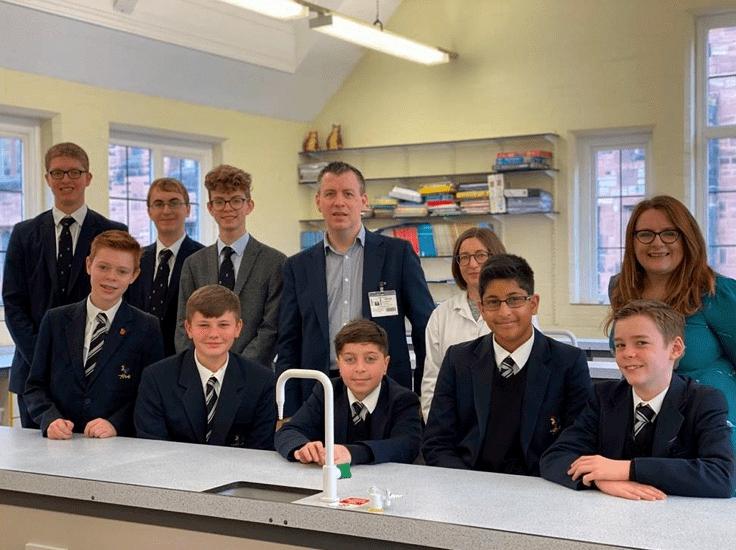


Students from Boys’ Division are working with Sixth Form students from Haslingden High School and optometrist Professor Phil Morgan from the University of Manchester to find out how long contact lens materials last in the environment. Professor Morgan is a world leading expert in the area of contact lens materials. Following a chance conversation over Twitter, Professor Morgan and Dr. Turner generated a research question. The project is funded by a Royal Society partnership grant, an established scheme to help school students work with researchers and which also provides a calendar of opportunities for communicating the results.

Plastics in the environment has been a hot topic since it first entered the public consciousness following David Attenborough’s hit documentary ‘Blue Planet’. There has been a lot of work in the area of single-use plastics in the food industry for example. Single-use plastics are ubiquitous in healthcare, as they offer a more hygienic alternative to instruments and devices that need sterilising between uses. This is one area where it is not easy to make changes to more sustainable materials. Contact lenses are one area where single-use is the most hygienic option and while there has been evaluation carried out on the packaging of disposable contact lenses, very little is known about the materials themselves.
Boys from Year 8 and 9 are focusing on formulating mixtures that could be used to break down the polymers in contact lenses. The older students at Bolton School and Haslingden High School will be looking at using spectroscopic techniques to find out how the formulations are affecting the bonds in the polymers. Other research will look at what would happen if a contact lens was flushed down the toilet and explore the behaviour of disposable contact lens users when they throw lenses away.


Congratulations have been in order this week for Nic Ford, Deputy Head (Academic) at Bolton School Boys’ Division, as he became one of the 25 nominees for the i25 Awards, which recognise innovators and influencers in independent schools.
Nic has headed up the roll out of the one-to-one iPad programme to over 1,000 pupils at Bolton School Boys’ Division and ensured that they have been fully integrated into school life as a teaching and learning tool. Included within the rollout has been the introduction of AI software as an aid for learning and academic intervention. Nic also changed the curriculum to allow time for coding in the DT curriculum and introduced VR into the classroom and, within months, a team of boys won the Viar360 international VR filmmaking competition! All this has helped the School become recognised as an Apple Distinguished School and as one of the top 50 schools nationally for EdTech for its innovative use of technology.
Nic said: "The deployment of iPads to every boy has raised pupil achievement. There has been a rise in academic attainment and progress made by students. In the first few years of roll out, 10% more boys achieved A* and A grades. The School has nearly doubled its value-added at A Level and improved behaviour for learning – pupils are increasingly engaged with learning resources and have

become better at self-study. Enjoying easy access to a wide range of tools from home, the boys can easily catch up after absences or be set work if off for longer periods. The iPads enable boys to practise retrieval and to work in more innovative, creative ways. Everyone can create resources, typified by Year 7 boys last year who earned the Junior Artsmark Award. The ISI said: “All students, especially those with SEND, were unequivocal that these technologies help them in organising work, revision and supporting their progress.
"Staff have been pleased with the rollout for many reasons, not least because it saves them time, an example being the AI programme, which enables staff to spend less time on marking and more time on targeted interventions with specific students based on computer diagnostics. All staff have gone through the Apple Teacher Programme, which gives them a high level of ICT skills and helps them use technology to support teaching and learning. As a consequence, all staff have developed skills and expertise and can use the technology to support classroom pedagogy. Besides Nic, the School now has three other Apple Distinguished Educators. "Parents have also benefitted from the iPads rollout and now have a clearer idea of what their boy is doing and needs to do to improve. They have access to the same learning resources as their sons and can keep tabs on their work. There has been close partnership with other educational institutions and Nic has
delivered training to other schools, presented at the national HMC Conference and shared expertise both in the UK and internationally."
The awards evening will take place in London in March of next year.



Over 1,000 local pupils from twenty secondary schools from across the North West joined pupils from the Boys’ Division and Girls’ Division for the annual RSC (Royal Society of Chemistry) Christmas Lecture held in the Boys’ Great Hall.

The audience, comprising pupils from state and independent schools in Year 9 and above, was treated to a spectacular ‘Flash Bang’ show from staff from King’s School, Macclesfield. A range of captivating chemistry experiments was conducted on stage, which gave a basic introduction to the world of atoms, molecules, solids, liquids and gases.
For seasoned attendees, there were some new displays this year, including ‘fire-flies’ and a great mortar finale. The science behind each colourful flash and percussive bang was fully explained, with students enjoying a wide range of demonstrations, including liquid nitrogen being used to create bright blue liquid oxygen and the explosive capacity of hydrogen. The propulsive powers of this highly reactive element were also revealed as the demonstrators fired hydrogen-powered bottlerockets across the increasingly smoky Great Hall, much to the delight of the audience! In what is always a fascinating presentation, the Chemistry students also learnt about the everyday practical applications of these reactions.

Agroup of Boys’ Division pupils have created commemorative artwork to honour the victims and survivors of the Holocaust. Art educator Caroline Slifkin worked with students for a whole day on this project, which was funded by the Holocaust Educational Trust.

With Caroline’s help, the boys looked at art as an act of spiritual resistance. In addition to looking at Jewish artists’ work, they also examined pieces produced by Jehovah’s Witnesses, Catholics, and Gypsies, Roma and Travellers and explored how art gave these artists strength and spirit. With all of this in mind, pupils produced moving pieces based on this year’s Holocaust Memorial Day theme: Stand Together.
The artwork will be displayed at Bolton Town Hall for the town’s public Holocaust Memorial Day service on 28 January 2020, 1.00-2.30pm.



Year 12 and Year 13 boys at Bolton School enjoyed an afternoon with Old Boltonians Peter Acton (1964-71) and David Seddon (1960-71). The former pupils spoke to the boys about the transition from university to the world of work. The afternoon was part of an Old Boys' mentoring scheme during which students will receive help in developing their CVs, with interview technique and general advice. The audience was told that employers want to know what you can bring to their business and whether you will fit into their culture, and are seeking to recruit employees that they can train and develop. The Sixth Formers were told to think about examples of their own leadership, reliability, communication and team player skills as well as being able to be enthusiastic and to ask intelligent questions based on diligent pre-interview research of the hiring company.
The scheme, run by the School’s Development Office, will see a number of mentors offering their professional experience in fields such as Journalism, Engineering, Law, Medicine, Banking and Property to support young undergraduates on an informal, one-to-one basis.




Three teams of Bolton School students took part in the Languages Debating Competition held at Cheadle Hulme School and all three disputed their way to the finals in two different languages! Pairs from the Boys’ and Girls’ Divisions took part in the Spanish competition, while a second Girls’ Division duo competed in French.
In the Spanish Competition, teams from both Divisions made it through the first rounds despite stiff competition. Rafaay Iqbal and Adam Whitmore went up against Altrincham Boys and Kings’ Chester, while Charleigh Adams and Lizzie Crowther faced The King’s School, Chester and Altrincham Grammar School for Boys. In the Semi-finals, the Boys’ Division met Manchester High School for Girls and the Girls’ Division debated against Altrincham Grammar School for Girls, with both Bolton School teams winning places in the Final! Both teams then had just fifteen minutes to prepare their arguments for and against the motion ‘green is better than red’. There was an atmosphere of friendly rivalry to this lively and heated final debate and, after a very close call, the Girls’ Division team were announced the winners.
Mrs. Lapinskas, a Boys’ Division Spanish teacher who accompanied the team, said: “Adam and Rafaay were very strong and impressed both the judges and other teachers with their language and debating skills. … The boys were very pleased with their efforts and rightly so, as it was a tremendous achievement overall, as it’s the furthest we’d have ever come in Spanish debating.”


Students in both Divisions had important lessons on Modern Slavery from Old Girl Susan Banister (1982 to 1989). She returned to Bolton School on two occasions in the Autumn Term, first addressing the whole of Year 10 from the Girls’ Division and then delivering her message to Boys’ Division Sixth Form students in Year 13.
Susan is a Modern Slavery consultant with Hope for Justice, who has hands-on experience of rescuing victims of forced labour in the UK, and over 25 years of experience working with businesses from start-ups to FTSE 100 companies. In her talks, she shared her understanding of the devastating effect that Modern Slavery has and how victims and businesses can find themselves exploited.
She introduced students to Hope for Justice, an organisation which exists in multiple locations across four continents and works to end Modern Slavery by preventing exploitation, rescuing victims, restoring lives and reforming society. She then asked what students already know about this crime by holding an informal quiz: amongst a host of other facts, students
discovered that most victims in 2018 originated from the UK, 48% of Modern Slavery victims are under 18 years old, and the average price of a victim sold into slavery is just £60.
Susan also discussed the Modern Slavery Act 2016, talked about child slavery and human trafficking, including the difference between trafficking and smuggling, as well as signs and indicators of Modern Slavery. She described the key drivers of human trafficking and barriers that prevent victims from disclosing their situation. She also related a number of real-world cases, including talking about Hope for Justice’s involvement in the largest anti-trafficking case in Europe.
Finally, Susan told students what they can do if they suspect Modern Slavery.
This was an informative and thought-provoking session for both groups of students who benefitted from Susan’s knowledge.
Boys and girls alike left her talk with a greater understanding of Modern Slavery and how organisations like Hope for Justice are working to put an end to this crime.



For four nights, pupils from Years 9 to 13 staged an adaptation of Charles Dickens’ ‘A Christmas Carol’. The classic tale tells the story of the miserly misanthrope Ebenezer Scrooge, who is visited by four ghosts on Christmas Eve and undergoes a dramatic transformation into a kind, warm and generous man.

The production was staged in the Boys’ Division Great Hall. The Hall’s raised stage, central aisle and numerous doors were well utilised to create a truly intimate and immersive experience. The lighting and sound effects were incredibly impressive. Liam Maloney served as technical director, having previously assisted on shows with the school. Liam was assisted by Harvey Ryan and Nathan Hayes, who all did a marvellous job of creating and maintaining an atmosphere that shifted from foreboding to hopeful and from festive to frightening.
The cast was led by Jude Ashcroft, who gave a commanding and energetic performance as Scrooge. Jude captured Scrooge’s callousness well, sneering down at Bob Cratchit and the audience from the podium, and then went on to portray a man forced to confront his own evils before changing for the better.
Jude was supported by a talented cast of pupils, who exhibited not only great professionalism, but also a good sense of fun. Particularly memorable performances came from Tom Whitehead as Fezziwig and Finley Littlefair as Bob
Cratchit, who serve as foils for the cold selfishness of Scrooge at the beginning of the play. Anthony Johnson and Jayden Luhar portrayed the ghosts of Jacob Marley and Christmas Yet To Come respectively and each gave suitably spooky and menacing performances. Kiran Sastry took on the iconic role of Tiny Tim and did so fabulously. His early scenes of familial joy and later scene where he welcomes the reformed Scrooge in for Christmas dinner were moving and a delight to watch. Hannah Clark, who joined the cast from the Octagon Youth Theatre, starred as Belle, Scrooge’s exfiancé and Tom Griffiths and Zayd Ascroft played the ghosts of Christmas Past and Present. Charlie Griffiths brought energy and hopefulness to the role of Fred, Scrooge’s nephew.
The main cast was supported by an ensemble of pupils, who helped to frame the action and drive the story onward. Direct quotation from Dickens’ short story helped make this an authentic and meaningful piece, whilst the use of


props such as Scrooge’s coffin and Marley’s chains really made key scenes stand out.
This was a really enjoyable and professional play. Thanks must go to the Octagon’s Imogen Woolrich, and Mrs. Fielding who provided direction and choreography respectively. Final thanks must go to our Director of Drama and Creative Learning, Ms. Lord, who produced the show and allowed a cast of very talented pupils to shine.


Headmaster Philip Britton welcomed a large gathering to this year’s Christmas Festival at Bolton School Boys’ Division. A rousing version of Once in Royal David’s City opened the evening, the first verse being sung by Year 7 Nathan Pierson before the Choir and congregation lent their voices. The first of several readings came from Joseph Williams, also Year 7, who read Isaiah 9: v2, 6-7 and this was followed by Darragh Livesey’s (Year 9) reflection ‘Jesus’ (Kenneth W. Osbeck). The Choir then offered up an inspiring version of Vivaldi’s Gloria before the whole congregation sang See Amid the Winter’s Snow. The Chamber Choir and the Lower School Choir then added their harmonies singing, respectively, The Shepherd’s Carol and Christmastime. Further readings – Luke 2: v1-7 came from Jonathan Featham in Year 7, and Year 8 pupil Isaac Lucas offered up the reflection ‘Before the Paling of the Stars’ (Christina Rossetti). There were then congregational offerings of Hark! The Herald Angels Sing and Joy to the World interspersed with another reading from Luke 2 (v8-14) from Tolu Fatunde of Year 11 and the reflection ‘10 Christmas Commandments’ read by Xuan Wang. The School Choir then performed the atmospheric Precious Child, So Sweetly Sleeping.
Old Boltonian the Reverend David Allen read from Luke 2 (v15-20) and Year 9 pupil Matthew Chae read ‘Good News’ (Larry Libby) before the Joint Chamber Choir sang the enchanting A Little Child There is Yborn. There was the traditional rendering of Mary’s Boy Child, which saw solos from Aden Stephenson (Year 13), Joshua Kay (Year 12) and James Hopkinson (Year 11) and some wonderful supporting voices from the Congregation for the

choruses. Mr. Britton read from John 1 (v1-14) and James Parfrey of Year 8 offered the reflection ‘Christmas is Really for the Children’ (Steve Turner) before the Senior Choir sang The Time of Snow with soloist support from William Martin and Michael Gatenby of Year 8 and Suyahb Valli of Year 7. Special guest for the evening was the Rector of the West Bolton Team, Reverend Stephen Tranter, who delivered an address on the importance of thinking of others and an updated and amusing 2019 version of Twas the Night Before Christmas poem, which became The Night Before the Election poem!
Stirring renditions from the gathering of Shine Jesus Shine and O Come, All Ye Faithful brought the festive evening to a close. The Headmaster offered thanks to the orchestra, the choirs, the

